- Home
- L. Ron Hubbard
Mission Earth Volume 2: Black Genesis Page 12
Mission Earth Volume 2: Black Genesis Read online
Page 12
Greetings:
DELBERT JOHN ROCKECENTER, JUNIOR
has completed his education to the
level of JUNIOR COLLEGE.
Signed, sealed (etc.)
It was a very imposing diploma. It had Confederate soldiers holding rifles at port arms. It had banners and cannons. Very fancy.
“Here’s the rest of the papers,” said Raht. They were attested transcripts of subjects and grades.
“What clever forgeries,” I said.
“Hells, no,” said Raht. “They’re the authentic signatures. The school closed last spring for keeps and the ex-faculty will do anything for a buck. You think I want to get sent up for forgery?”
Always complaining, even when you give him a compliment.
“Where’s Terb?” I demanded. “We haven’t got much time.”
“Maybe he’s having trouble. The old clerk at that (bleeped) courthouse didn’t want to come down after hours.”
Captain Stabb looked in, pointing at his watch. “We’re going to have to race to make it now. We have to get back while it’s still night!”
But here was Terb, leaping in through the air lock. Terb is one of the most unremarkable Earthmen you’d ever want to see. A bit on the plump side, a bit swarthy, but you would never pick him out in a crowd. He’s from the planet Dolo and they were very glad to get rid of him.
“Not Officer Gris himself!” he said. “We must be important after all! Raht, I been wrong. All this time I been telling you we was just dirt and now . . .”
“Shut up,” I said. “Is the birth certificate fixed?”
Terb nodded. He took a small electric switch out of his pocket. “The old clerk wants to see him so he can attest the certificate is issued to a real person known to him that ain’t dead. He don’t like to be thought crooked. This bird we got here will present himself, hand over another C-note, get the certificate all signed. Then the instant he walks down the steps of that courthouse, I hit this and goodbye clerk, goodbye records. I planted the bomb before dawn today. Right in the record files!”
I gave them the activator-receiver. “This is a special bug. You must keep this within two hundred miles of him at all times.”
“But we got him bugged,” said Raht. “There’s bugs in those clothes and there’s bugs in those suitcases and we have the activator right here. We can’t possibly lose him!”
“This is another type of bug, an aerial bug,” I lied. “It’s inserted in his elbow and registers if he handles explosives or touches guns: we don’t want you getting shot.”
Oh, that was different!
“We can spot him from a ship with this,” I lied. “Now this is the 831 Relayer. Keep it right with the activator-receiver.”
They got that.
“Just leave them turned on all the time. See, they look like a telephone connection box. You can put them on the outside of any building or under a bed.”
They promised.
Then Raht said, “Money. For us. Inflation is awful!”
I handed them a draft on the Chase-Arab New York Bank. They were happy. So was I: it was government money.
I gave them a few tips. Then I said, “Now get out of here before he sees you.”
They went diving out of the air lock, sprinted past the faintly moonlit plantation house and were gone.
Stabb was looking at his watch.
Heller came out. And oh, I had to laugh! Clothes to fit men six feet two inches tall aren’t to be had in southern Virginia. They were all too small!
Raht had done a wonderful job. The jacket was LOUD! Huge red and white checks. The pants were LOUD! Huge blue and white stripes. The hat was a bright green, banded Panama: too small! The shoes were orange suede and too tight! The shirt was purple!
He would stand out like a searchlight!
The clothes did look expensive, like they’d been bought by someone with lots of money and no taste at all.
And they looked like they had been outgrown.
Wonderful!
He was lugging the two huge suitcases.
“Don’t you think this wardrobe is a bit garish?” he said.
“In the height of fashion! In the height of fashion!” I replied.
I rapidly told him again where he was supposed to go to get his birth certificate. I handed him the other papers.
Then I knelt down in the air lock, pointing a night scope up the road. I wanted to make sure Raht and Terb were out of sight and that the area was still clear. Something was moving in the brush.
“I’m a bit hungry,” said Heller behind me. And then he seemed to wander off into the ship.
Stabb came to me. “He says he wants . . .”
“Give him whatever he wants,” I said. There was something moving over there by a slave cabin.
Heller was there again. “I’m going to need some money.”
Oh, yes. His money. The orders said five thousand dollars so he’d look affluent. I pulled two thousand out of my pocket and handed it to him. Three thousand wasn’t bad for a night’s work.
He was closing up some straps on a suitcase.
“We’re awful close to time,” said Stabb.
I saw what the object that had been moving was. A fox. To Hells with it.
I stood up and turned to Heller. I put out my hand. He, however, didn’t take it. Instead, he was extending a letter to me. “Do me a favor, would you, and mail this? I promised to keep him informed.”
I took it and put it in my pocket. I was too intent on getting rid of him to pay it any heed. “Well, good luck, Jettero,” I said. “This is it. Off you go.”
He dropped to the ground, lugging the two big cases. He limped off past the moonlit plantation house.
“Bye-bye, Heller,” I said to myself. “And I hope you make a lot of good friends in the pen!”
“We’re taking off,” said Stabb.
I got out of their way. The second engineer dropped out of the air lock with a machine in his hand. Stabb lifted the tug six feet off the ground and held it there. The second engineer ducked around with his machine and made all the grass stand up straight where the ship had been. He threw his machine into the air lock. The second pilot gave him a hand back aboard. They closed the latches.
The captain said to me, “Are you under orders to make our ship incapable of leaving this solar system?”
As a matter of fact, I was. From the assassin pilot. But it wouldn’t do to tell Stabb his ship was to be disabled. “Why?” I said.
“He took the time-sight out of the flight deck just now,” said the captain. “And if there’s another one, we can’t get to it. He’s double-barred all his cabins and storage spaces: we won’t be able to get into them even with a blastgun! Without a sight, we can’t fly her in outer space. But I suppose that’s what you required: you said to give him anything he wants.”
So what? Who wanted to ride in this (bleeping) tug and maybe get shot down?
Stabb sent the ship hurtling into the sky.
Now to race back to the base and land just before dawn.
Stabb cranked the tug auxiliaries up toward the speed of light.
I was jubilant.
Heller was off my hands!
I couldn’t wait to get back to a viewer and see how he got everything he had coming to him. The (bleepard). All the trouble he’d caused!
PART FOURTEEN
Chapter 1
Less than two hours later, I was sitting in my secret room in my villa, about 105 degrees of longitude from Heller, watching his every move.
I was ecstatic! The picture on the viewer was brilliant! The sound was perfect even down to the crickets! The 831 Relayer was doing its job!
I had to backtrack the recording strip a bit to where he left the ship.
And there he was, carrying two heavy suitcases, limping through the Virginia night. Up ahead there was a farmhouse, shedding light across a barnyard.
Any true spy, even slightly trained, would have taken a wide path around it. But not Heller!
Then there was a savage snarl!
A huge sheep dog barred the way!
I realized with a chuckle that Heller had probably never seen a dog. The nearest thing to it were the hondos of Flisten which, when domesticated, specialized in chewing up the whole family.
There it stood, fangs bared! It was crouching down. I knew it would charge. Goodbye, Heller. This thing is going to end right here on a hot night in Virginia and between the fangs of a dog!
With a short run to get a fast start, it sprang into the air, the fangs aimed straight for Heller’s throat!
Heller let go the suitcases.
His hands flashed out.
He grabbed the dog by the loose skin on either side of the jowl!
Pivoting on his heel, using the momentum of the dog, he sent the beast twenty feet behind him!
It sailed through the air! With a clunk, it collided with a tree, let out one yelp and lay still.
I expected Heller to run. That much sound would attract attention in the nearby house.
Heller walked over to the dog and examined it. Then he picked the big brute up in his arms. He went back to his suitcases and somehow got hold of their handles.
He was limping to the lighted house!
The screen door opened. A farmer was standing there with a shotgun!
Heller limped right on up to the porch. He dropped his suitcases. “Ah’m afraid yoah dawg ran intah a tree,” said Heller in a thick Virginia accent.
The farmer opened the door wider and Heller took the dog into the living room and laid it down on the rug. “He ain’t bleedin’ none, so Ah s’pose he’ll come around,” said Heller.
The Virginian bent over the dog. It made a feeble struggle to get up and the farmer petted it and it relaxed with a faint thump of its tail.
“Naw,” said the farmer, “he ain’t hurt none. You f’um heahabouts, kid?”
“Heahabouts,” said Heller. “Ah’ll be gittin’ on now.”
“Hell, no. Not aftah you done a decent thing lahk that! Martha, bring some cawfee in heah!” he yelled toward the kitchen.
“Aw, no,” said Heller. “Ah be much obliged. But Ah got me an appointment in town. A fellah’s a-waitin’ foah me at th’ co’thouse. Ah’m much obliged but Ah be late awready.”
“Well, hell, kid, tha’s more’n two mile. An’ you limpin’ an’ all. Be downright unneighbo’ly of me not to run you intah town! Ah’ll git mah truck!”
The dog had gotten over on its belly. It was staring at Heller with the strangest look.
The farmer cranked up his truck outside and Heller picked up the suitcases, tossed them into the back and got in. And they rattled off to town.
(Bleep), I thought. That didn’t go so good. It was the Virginia accent that had brought it off. (Bleep) that Countess Krak! She ought to stick to teaching freaks!
Heller alighted at the courthouse. The farmer said, “Drop by any ol’ tahm, when ya’ll comes back home, kid.”
“Ah be lookin’ fohw’d to ut,” said Heller, “an’ much obliged foah th’ lift.”
And off went the farmer.
Heller looked up at the courthouse. There were just two windows lit on the second floor. The front door was open and Heller limped up the steps. He pushed open a door.
A real old codger, dressed in black, was hunched over a desk in the space behind the counter. He had a couple of file drawers open. The sign on his desk said:
BIRTHS AND DEATHS,
WAIT IN LINE PLEASE
I hoped the old (bleepard) was properly in line himself. He would be dead in about five minutes.
Heller walked up to the counter and dropped his bags.
The old man raised his half-bald, gray head. “You th’ boy?”
“Tha’s what they say,” said Heller.
“Ah wondered if it would evuh come to this,” said the old man, cryptically. He came over and looked at Heller closely. “So you be Delbert John Rockecenter, Junior?”
“Tha’s what they say,” said Heller.
“That be two hundrud dollahs,” said the old man, pushing a birth certificate forward but holding on to it.
Hah, I thought. America is crooked as always. He’d upped the price a hundred.
Heller reached into his pocket. You could see the money was strange-looking to him. He turned some of the bills over.
The old man reached across and plucked two hundreds off the roll and pocketed them.
Heller picked up the birth certificate. It gave his name, said he was blond, said he’d been born at home. It had a seal on it and the clerk’s signature. The date of birth made Heller just seventeen! Heller put it in his pocket.
“Much obliged,” said Heller.
He picked up the bags, turned and limped back down the curving courthouse steps. He pushed through the front door and walked down into the street.
I turned the audio volume down, knowing what was coming.
With a roar and flame and a splintering crash, the upper windows of the building blew out!
Standard procedure.
Goodbye, you old cheating (bleepard), I said. Always give a prayer for the dead. It brings luck.
Flame was starting to gush out through one of the windows. When Terb bombs something, he really bombs it. He’s fond of exaggeration. And he always uses locally obtained explosives, too, avoiding any Space Code break. A master!
Wait! What in the name of Gods was Heller doing! That blast would attract attention even on this deserted hill. Fire engines existed even in Virginia. In fact, they are so proud of their fire engines, they’re always having rallies of volunteer fire companies for miles around!
Any trained man would have understood. And he would have started running. Fast!
Not Heller! He dropped his suitcases. He streaked through the main door. He raced up those stairs. He bashed his way into Births and Deaths!
The place was on fire! It was filled with smoke!
Even the counter was blown over! Heller was down, right at floor level. He snaked ahead, feeling through the churning fury.
He found a hand, a sleeve. He yanked. A body was in view.
There was a carpet on the floor. Heller snapped the ends to him. He wrapped it around the old man with two quick jerks.
He went backwards, dragging the wrapped body with him.
He got to the stairs and threw the carpeted body over his shoulder and went down five steps at a time.
He burst into the open air. He stepped sideways to a strip of lawn.
Oh, well, I thought. Not too bad. They always arrest everybody in sight when there’s a bomb explosion. That’s why you have to get away from them quick. And Heller was staying right there, the idiot.
He unwrapped the old man. He beat out some bits of smoldering cloth.
The old man opened his eyes, “What . . . what in hell was that?”
“You all raht?” said Heller.
The old man felt around. “Ah be purty bruised up but she don’ look like nothin’ broke. It’s that (bleeped) stove. I tol’ ’em t’ shut it off las’ spring! She blew up befo’. Th’ pilot light goes aht and she fills with gas. . . .”
The old man’s eyes were staring at the building. Heller looked. The windows were all blown out and part of the roof and the flames were starting to roar up with lashing tongues into the sky.
It was just now sinking in what had happened to him. He was staring at Heller, his eyes going round. “Jesus Christ, kid,” he said with awe. “You risk yoah neck somethin’ awful draggin’ me aht o’ there!” He shook his head as though to clear his eyes. He looked at Heller much more intensely. “You saved mah life, youngster!”
Heller was making sure the old man was all right. He was trying to get him to flex his fingers.
Over on the other side of town, what was probably a volunteer fire department was getting busy. A summons bell was clanging, shattering the night.
“Shouldn’ Ah call somebody or somethin’?” said H
eller. “An ambeoolance?”
“Kid, look. Ah jus’ thought. Jesus Christ, you bettuh git aht o’ heah! There’ll be fiahmen and repohtahs ahl ovah this place in about one minute. Ah’ll be ahl raht, youngster. Ah’ll nevah fohget you. But with a name lahk yoahs, you bettuh run lahk hell, quick!”
“Glad Ah could help aht,” said Heller. And he moved off.
“If’n Ah can evuh be moah help t’ you,” the old man called after him, “you jus’ yell fo’ Stonewall Biggs!”
Heller walked down the hill, carrying his bags. The ground was bathed with the fiercely burning courthouse fire.
He was on the street sidewalk when the fire engine passed. He looked back, then stood waiting. The whole top of the hill was being crowned in flames. There went a Virginia landmark. Probably, I thought, George Washington had slept there.
Shortly, an ambulance went by.
Heller hefted his bags and limped onward toward the bus station.
He stopped suddenly. He got out a notebook. He wrote:
They can’t make stoves.
PART FOURTEEN
Chapter 2
A black man was standing at the door of the bus station, broom in hand, an old hat on the back of his head. He was looking up the street to the fire on the hill. I hoped he would wake up and notice there was a stranger in town and connect him with the fire.
“When is the next bus?” said Heller.
“Hoo-ee,” said the black. “Now, ain’t that some fiah! Y’all evuh see a fiah that big?”
I imagine Heller, as a Fleet combat engineer, had seen whole cities on fire. He had probably set some himself that would make that courthouse fire look like a stray spark.
“Tha’s purty big,” said Heller. He went in and put down his bags.
It was a very dingy bus station: ripped-up plastic seats, discarded newspapers on the floor. There was a ticket wicket at the far end.
The black man came in, shaking his head. He put down the broom, went into the wicket and took off his hat. With a flourish, he opened the front of the wicket. “Wheah you goin’?” he called. “Richmun’, Washin’ton, New Yahk, Mahami? O’ maybe Atlanta?”
“Atlanta?” said Heller, walking over to the counter. I thought, here we go again! More Manco! More Prince Caucalsia!
“Oh, tha’s a fahn town,” the black man said. “Plenty white ladies, yallah ladies, black ladies. Any coluh you got a wishin’ fo’. A real fahn town. Or maybe you’d lahk Buhmin’ham. Now that is the fahnes’ town you evuh hope to see, man.”

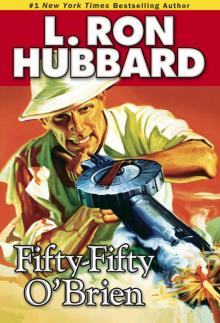 Fifty-Fifty O'Brien
Fifty-Fifty O'Brien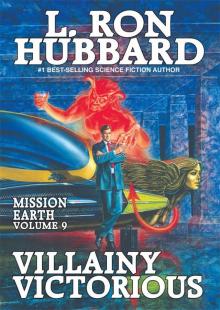 Villainy Victorious
Villainy Victorious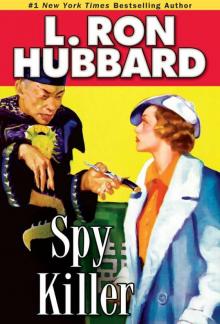 Spy Killer
Spy Killer Ai! Pedrito!: When Intelligence Goes Wrong
Ai! Pedrito!: When Intelligence Goes Wrong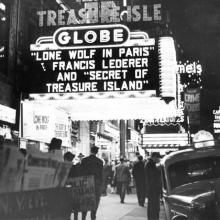 The Dangerous Dimension
The Dangerous Dimension Mission Earth Volume 1: The Invaders Plan
Mission Earth Volume 1: The Invaders Plan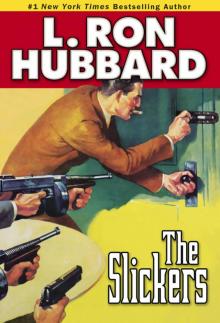 The Slickers
The Slickers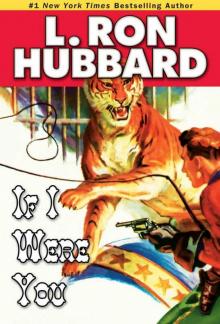 If I Were You
If I Were You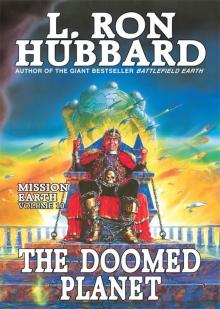 The Doomed Planet
The Doomed Planet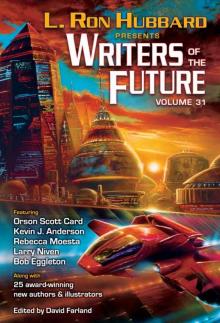 Writers of the Future Volume 31
Writers of the Future Volume 31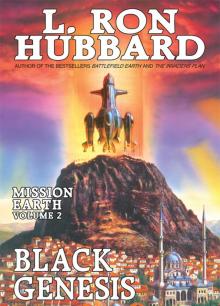 Mission Earth Volume 2: Black Genesis
Mission Earth Volume 2: Black Genesis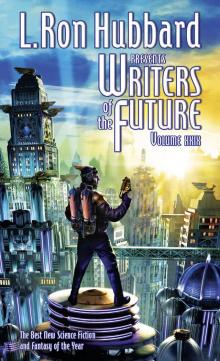 Writers of the Future: 29
Writers of the Future: 29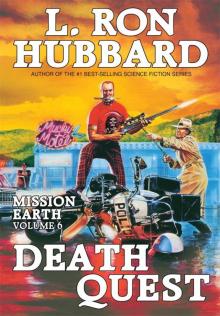 Death Quest
Death Quest The Enemy Within
The Enemy Within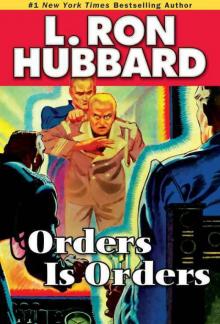 Orders Is Orders
Orders Is Orders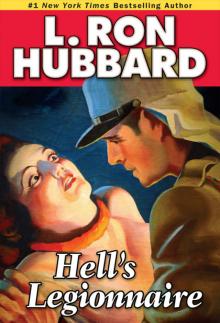 Hell's Legionnaire
Hell's Legionnaire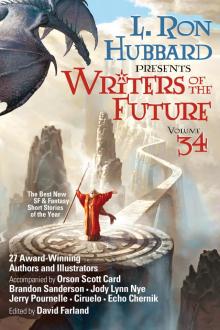 L. Ron Hubbard Presents Writers of the Future 34
L. Ron Hubbard Presents Writers of the Future 34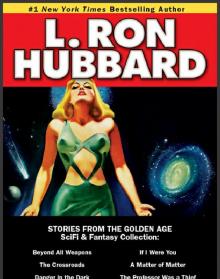 The Scifi & Fantasy Collection
The Scifi & Fantasy Collection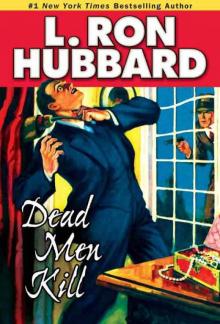 Dead Men Kill
Dead Men Kill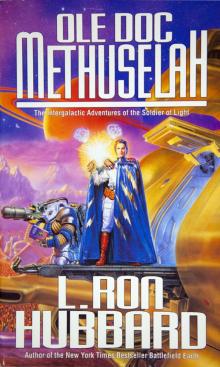 Ole Doc Methuselah: The Intergalactic Adventures of the Soldier of Light
Ole Doc Methuselah: The Intergalactic Adventures of the Soldier of Light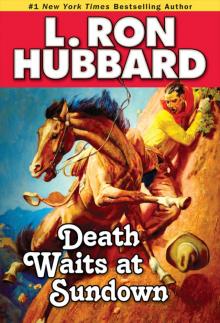 Shadows From Boot Hill
Shadows From Boot Hill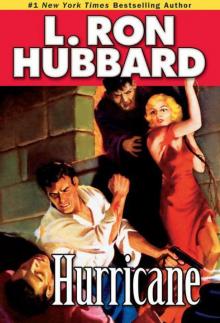 Hurricane
Hurricane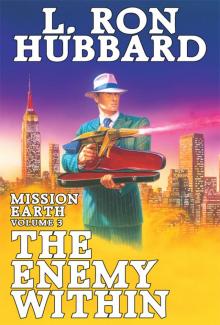 Mission Earth Volume 3: The Enemy Within
Mission Earth Volume 3: The Enemy Within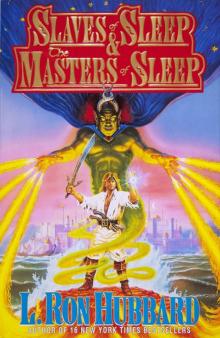 Slaves of Sleep & the Masters of Sleep
Slaves of Sleep & the Masters of Sleep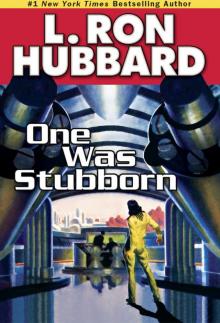 One Was Stubborn
One Was Stubborn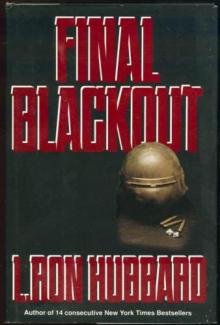 Final Blackout: A Futuristic War Novel
Final Blackout: A Futuristic War Novel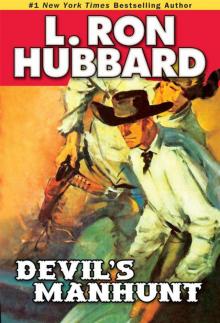 Devil's Manhunt
Devil's Manhunt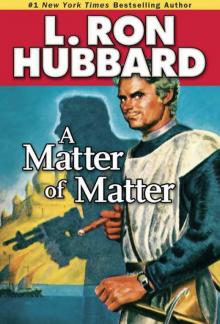 A Matter of Matter
A Matter of Matter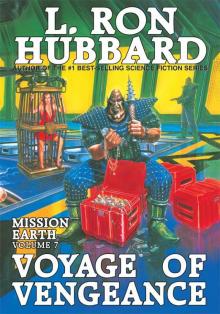 Voyage of Vengeance
Voyage of Vengeance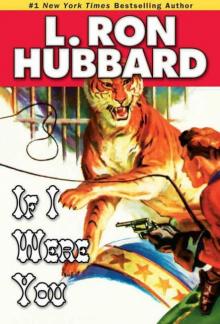 If I Were You (Science Fiction & Fantasy Short Stories Collection)
If I Were You (Science Fiction & Fantasy Short Stories Collection)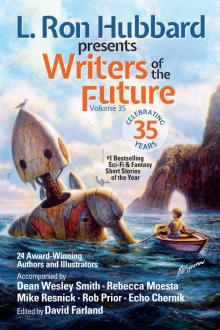 L. Ron Hubbard Presents Writers of the Future Volume 35
L. Ron Hubbard Presents Writers of the Future Volume 35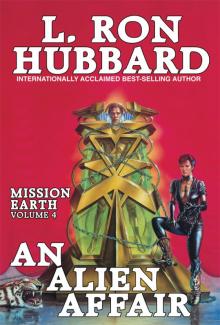 Mission Earth Volume 4: An Alien Affair
Mission Earth Volume 4: An Alien Affair Black Genesis
Black Genesis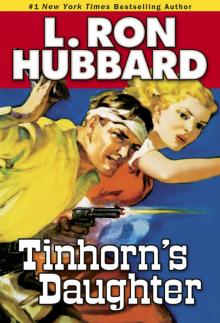 Tinhorn's Daughter
Tinhorn's Daughter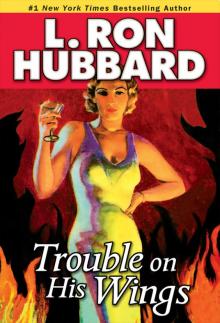 Trouble on His Wings
Trouble on His Wings Writers of the Future Volume 27: The Best New Science Fiction and Fantasy of the Year
Writers of the Future Volume 27: The Best New Science Fiction and Fantasy of the Year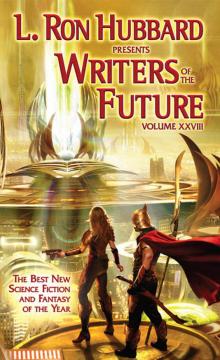 Writers of the Future Volume 28: The Best New Science Fiction and Fantasy of the Year
Writers of the Future Volume 28: The Best New Science Fiction and Fantasy of the Year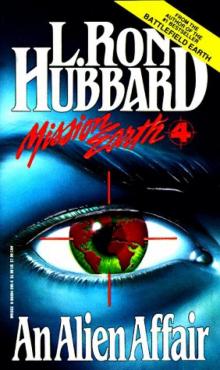 An Alien Affair
An Alien Affair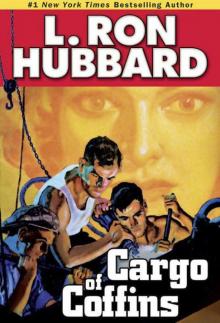 Cargo of Coffins
Cargo of Coffins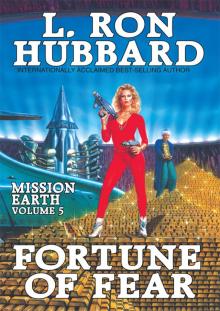 Mission Earth Volume 5: Fortune of Fear
Mission Earth Volume 5: Fortune of Fear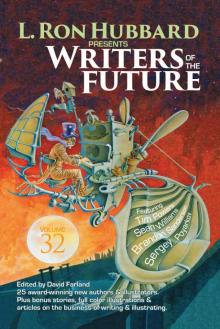 Writers of the Future 32 Science Fiction & Fantasy Anthology
Writers of the Future 32 Science Fiction & Fantasy Anthology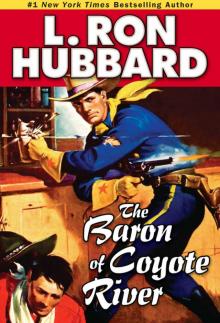 The Baron of Coyote River
The Baron of Coyote River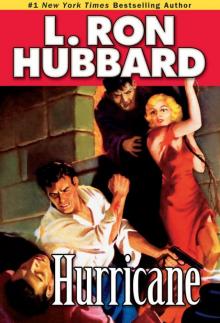 Hurricane (Stories From the Golden Age)
Hurricane (Stories From the Golden Age)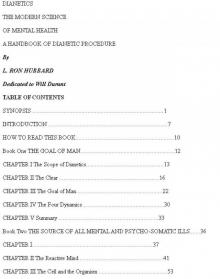 Dianetics: The Modern Science of Mental Health
Dianetics: The Modern Science of Mental Health Writers of the Future, Volume 30
Writers of the Future, Volume 30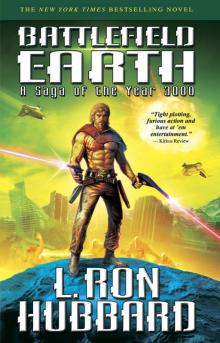 Battlefield Earth: A Saga of the Year 3000
Battlefield Earth: A Saga of the Year 3000 Fear
Fear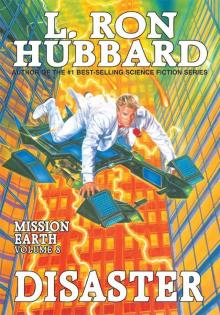 Disaster
Disaster Invaders Plan, The: Mission Earth Volume 1
Invaders Plan, The: Mission Earth Volume 1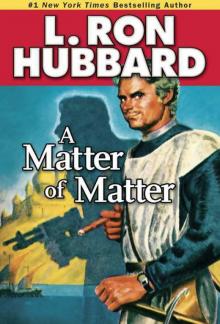 A Matter of Matter (Stories from the Golden Age)
A Matter of Matter (Stories from the Golden Age)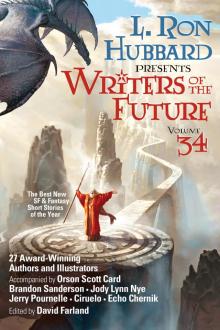 Writers of the Future Volume 34
Writers of the Future Volume 34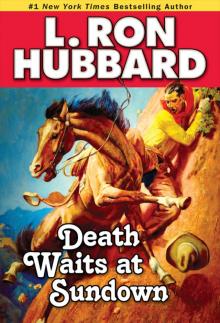 Death Waits at Sundown
Death Waits at Sundown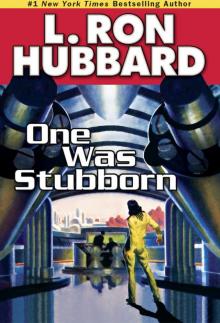 One Was Stubbron
One Was Stubbron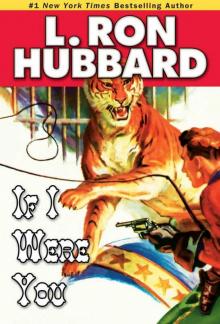 If I Were You (Stories from the Golden Age)
If I Were You (Stories from the Golden Age)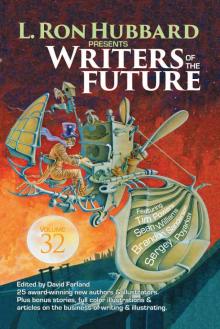 Writers of the Future 32 Science Fiction & Fantasy Anthology (L. Ron Hubbard Presents Writers of the Future)
Writers of the Future 32 Science Fiction & Fantasy Anthology (L. Ron Hubbard Presents Writers of the Future)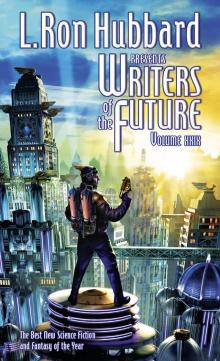 Writers of the Future, Volume 29
Writers of the Future, Volume 29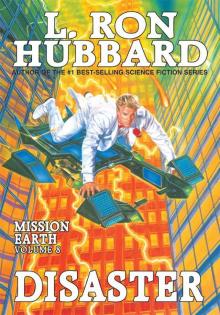 Mission Earth Volume 8: Disaster
Mission Earth Volume 8: Disaster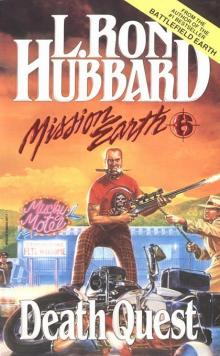 Mission Earth 6: Death Quest
Mission Earth 6: Death Quest Writers of the Future, Volume 27
Writers of the Future, Volume 27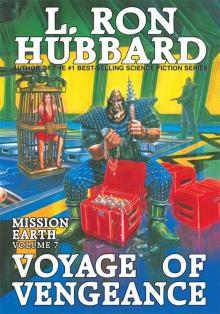 Mission Earth Volume 7: Voyage of Vengeance
Mission Earth Volume 7: Voyage of Vengeance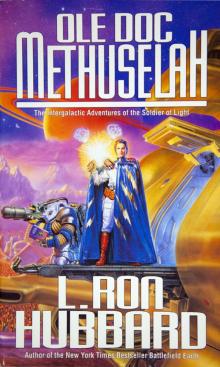 Ole Doc Methuselah
Ole Doc Methuselah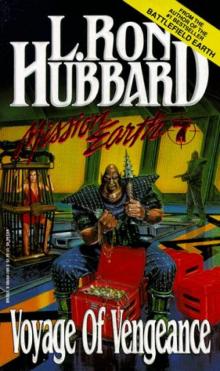 Mission Earth 07: Voyage of Vengeance
Mission Earth 07: Voyage of Vengeance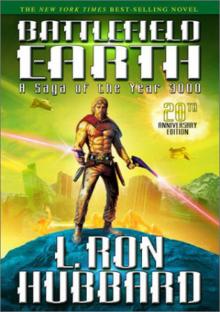 Battlefield Earth
Battlefield Earth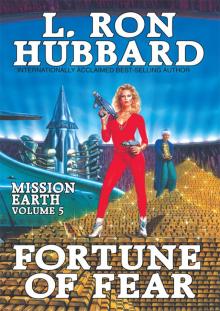 Fortune of Fear
Fortune of Fear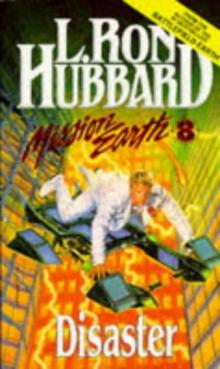 Mission Earth 8: Disaster
Mission Earth 8: Disaster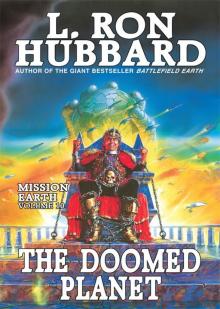 Mission Earth Volume 10: The Doomed Planet
Mission Earth Volume 10: The Doomed Planet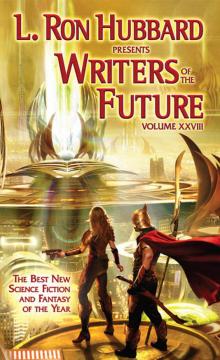 Writers of the Future, Volume 28
Writers of the Future, Volume 28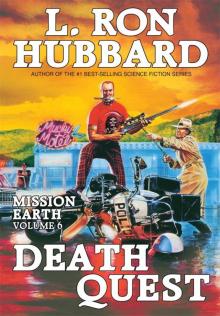 Mission Earth Volume 6: Death Quest
Mission Earth Volume 6: Death Quest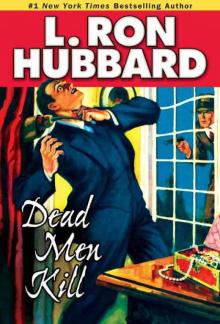 Dead Men Kill (Stories from the Golden Age)
Dead Men Kill (Stories from the Golden Age)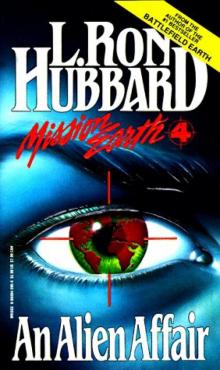 Mission Earth 4: An Alien Affair
Mission Earth 4: An Alien Affair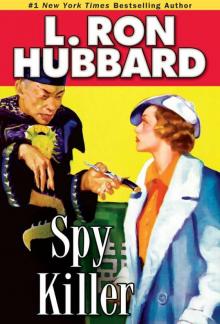 Spy Killer (Stories from the Golden Age)
Spy Killer (Stories from the Golden Age)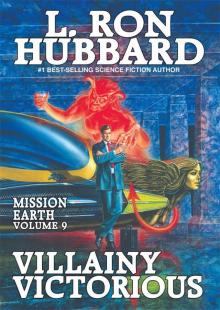 Mission Earth Volume 9: Villainy Victorious
Mission Earth Volume 9: Villainy Victorious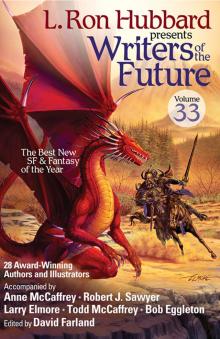 L. Ron Hubbard Presents Writers of the Future, Volume 33
L. Ron Hubbard Presents Writers of the Future, Volume 33